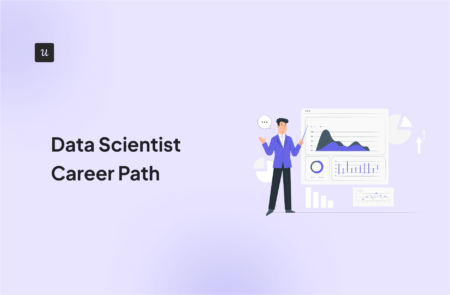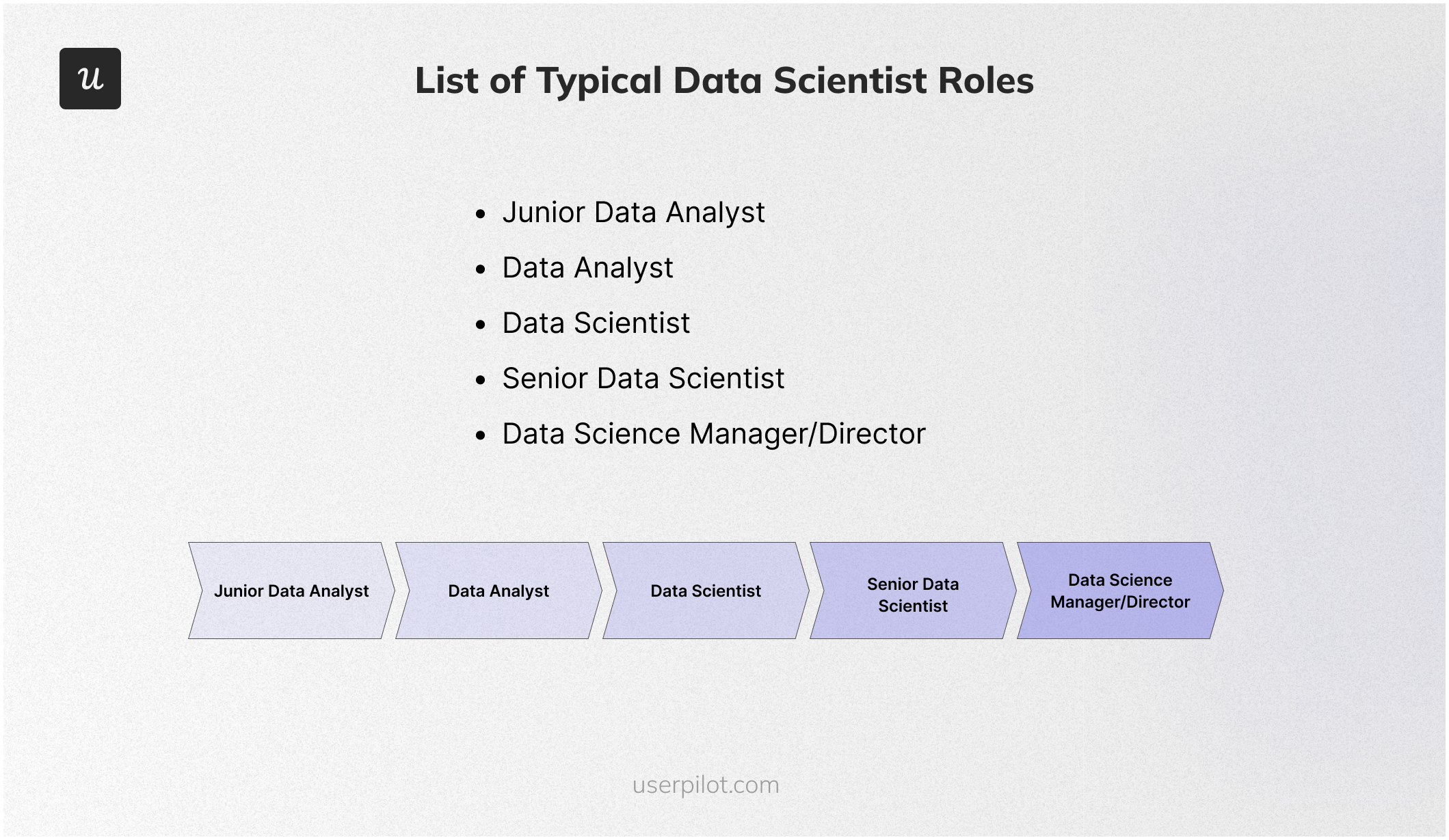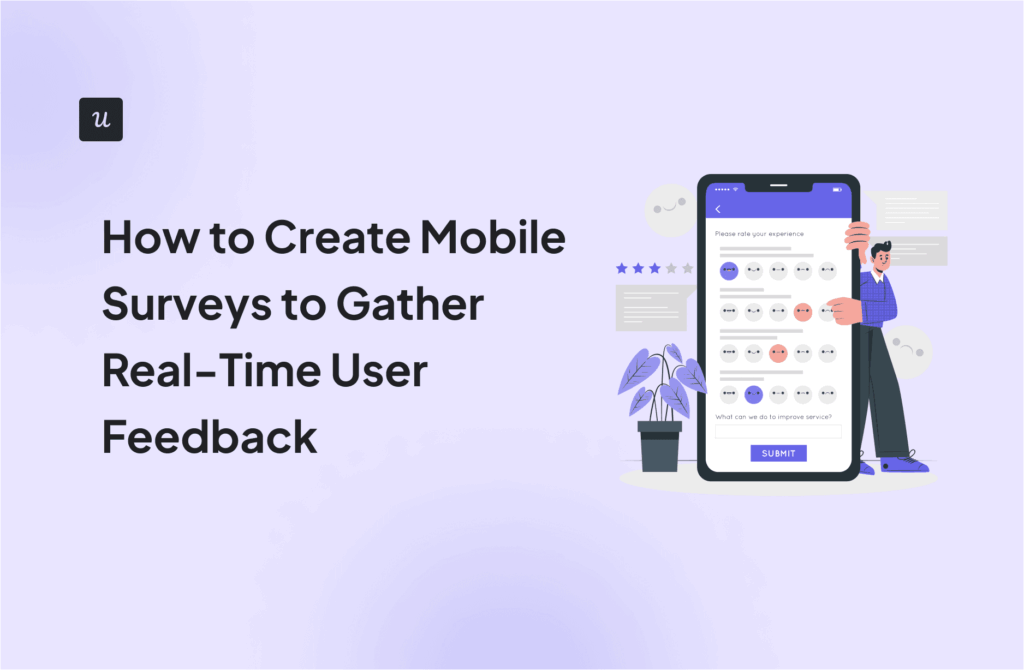
Try Userpilot Now
See Why 1,000+ Teams Choose Userpilot

What is the typical career path for data scientists?
Here’s a breakdown of a typical data scientist career path, with information on how to progress and the estimated experience needed for each level:

- Junior Data Analyst (0-2 years): You’ll need a bachelor’s degree in a relevant field (statistics, computer science, etc.), strong analytical skills, and basic programming experience (Python, R). You can look for internships or entry-level analyst roles.
- Data Analyst (2-4 years): This position often requires a solid foundation in data analysis methodologies and data manipulation skills. You should deepen your technical skills in programming languages (Python, R) and data analysis tools (SQL, machine learning libraries) or contribute to data science projects alongside senior data scientists.
- Data Scientist (4-7 years): This is a core data science role requiring strong programming, statistical modeling, and problem-solving skills. At this point, you must master advanced machine learning algorithms and techniques like deep learning. It also matters to specialize in a particular industry or domain (e.g., finance, healthcare) or lead and mentor junior data scientists.
- Senior Data Scientist (7+ years): This senior-level role demands extensive expertise in data science techniques and the ability to manage complex projects and teams. You can continuously learn about new technologies and trends in data science.
- Data Science Manager/Director (10+ years): This leadership role requires extensive data science experience combined with strong business management and communication skills. For example, you’ll be in charge of setting the strategic direction for the data science function within an organization. You also take responsibility for overseeing budgets and resources for data science projects.
How to become a data scientist
The journey to becoming a data scientist can be tailored to your background and learning style. Here’s a roadmap gleaned from real-world discussions on platforms, along with insights from hiring managers:
Earn your foundational education
- A bachelor’s degree in data science, computer science, statistics, or a related field provides a strong foundation in math, statistics, and programming. However, some break into the field through alternative routes like boot camps or online courses.
- For boot camps, research reputable boot camps like Springboard, Flatiron School, or General Assembly to find programs that align with your learning style and budget. Look for boot camps with strong industry connections and career services to maximize your chances of landing a job.
- Platforms like Coursera, edX, and Udacity offer a vast array of data science courses and specializations from top universities and companies. These courses can be a great way to learn at your own pace and build specific skills. Popular options include the IBM Data Science Professional Certificate on Coursera or the Applied Data Science with Python Specialization on the University of Michigan platform. Look for courses that offer hands-on projects and industry-recognized certificates.
Sharpen your skills
Regardless of your educational path, fortify your technical skills. Online courses, tutorials, and personal projects are fantastic ways to master in-demand programming languages like Python and SQL.
Look for internship opportunities
Internships provide invaluable hands-on experience and a chance to apply your skills in real-world scenarios. Look for opportunities at companies working in areas that interest you. Don’t be discouraged if your first attempt isn’t at a big tech firm – even smaller companies offer valuable learning experiences.
Here are a few job sources you can watch out for:
- Many companies, especially larger ones, post internship opportunities directly on their careers pages. Look for companies working in areas that pique your interest, such as healthcare, finance, or technology.
- In addition, popular job boards like Indeed, Glassdoor, and LinkedIn often have dedicated sections for internships. Utilize filters to search for “data science internship” or related terms, and refine your search by location, company size, or industry.
- You can also engage with online data science communities on Reddit, Quora, or data science forums. Many professionals actively share internship opportunities within their networks.
Build your portfolio
Showcase your abilities by contributing to open-source projects on platforms like GitHub. You can also work on personal projects that allow you to explore your interests and demonstrate your data science capabilities to potential employers.
Network and learn
Actively engage with online data science communities on Reddit, Quora, or data science forums. Attend meetups and conferences to connect with other aspiring and experienced data scientists. The data science community is welcoming and thrives on knowledge sharing.
Best resources for data scientists
Data science is a rapidly evolving field, and staying updated with the latest trends, tools, and techniques is crucial for success. In this section, we’ll explore some of the best resources for data scientists, including books, blogs, and online courses, that can help you enhance your skills and stay at the forefront of the industry.
Best books for data scientists
Data science is a vast field, so the best books for you will depend on your experience level and area of interest. Here are some highly-rated books across different categories to kickstart your data science journey:
- Python for Data Analysis by Wes McKinney: This book is a fantastic introduction to using Python for data analysis. It covers the basics of Python programming, data structures, and popular data science libraries like NumPy, Pandas, and Matplotlib.
- Hands-On Machine Learning with Scikit-Learn, Keras & TensorFlow by Aurélien Géron: This book dives deeper into machine learning algorithms and their practical implementation using popular Python libraries like scikit-learn, Keras, and TensorFlow.
- Naked Statistics: Stripping the Dread from the Data by Charles Wheelan: This book makes statistics approachable and engaging, even for those with math anxiety.
- Thinking with Data by Nathan Yau: This book goes beyond the technical aspects of data science and explores how to think critically about data, ask the right questions, and communicate findings effectively.
- Data Science for Business by Foster Provost and Tom Fawcett: This book bridges the gap between data science and business. It explains how data science can be used to solve real-world business problems and provides case studies of successful data science applications.
Best webinars for data scientists
Are you looking to level up your data science expertise but are short on time? Webinars offer a fantastic way to learn from industry leaders and gain valuable insights in a concise format. Here’s a list of highly-rated webinars:
- Data Science Salon: Offers both live and recorded webinars on a wide range of data science topics, from fundamentals to cutting-edge applications. They also have an active community forum for discussions.
- BrightTalk: Hosts webinars on various tech topics, including a dedicated section for data science with a good selection of free and paid options.
- Meetup: Local groups focused on data science often host online webinars on various topics. Check for meetups in your area or browse online groups relevant to your interests.
- Major tech companies like Microsoft, Google, and Amazon frequently host webinars on data science tools and applications related to their platforms. Check their developer portals or social media for upcoming events.
Best blogs for data scientists
To empower your learning journey as a data scientist, here’s a curated list of top data science blogs:
- Data Science Central: This comprehensive resource hub covers everything in data science, from analytics and machine learning to code and career advice.
- KD Nuggets: Known for its in-depth dives into specific data science topics and algorithms, KD Nuggets is a favorite among data professionals for staying sharp on the latest trends.
- Towards Data Science (on Medium): This massive online community publishes articles from a wide range of data science professionals. You can follow it to stay updated on the latest advancements and to find diverse perspectives.
- The Mockup Blog: Authored by Thomas Mock, a data science leader at Netflix, this blog offers valuable insights into the real-world applications of data science within companies.
- DataCamp Blog: This blog caters to aspiring and beginner data scientists with clear tutorials, project ideas, and career tips.
Best podcasts for data scientists
Based on insights from online reviews and discussions, here’s our favorite list of podcasts for data scientists at different experience levels:
- Lex Fridman Podcast: This isn’t strictly data science, but Lex Fridman’s interview format delves deep into AI and its connection to data science.
- Data Skeptic: A long-running favorite, Data Skeptic tackles a wide range of data science topics with a critical eye.
- Not So Standard Deviations: Hosted by statisticians Roger Peng and Hillary Parker, this podcast offers a deep dive into statistical methods used in data science.
- Making Data Simple: Hosted by AI VP at IBM, Martin AI, this podcast focuses on making complex data science concepts understandable for a broader audience.
- SuperDataScience: With short and long episodes, Kirill Eremenko’s podcast, SuperDataScience, covers a wide range of data science tools and techniques in a lighthearted and informative way.
Best tools for data scientists
Data scientists rely on a suite of powerful tools designed to collect, process, analyze, and visualize data. So here’s a list of the top tools that every data scientist should consider:
- Tableau (Best for data visualization): Tableau is a data visualization tool that allows users to create interactive dashboards and reports. This can help data scientists identify trends and patterns in their data that would be difficult to see in a spreadsheet.
- Power BI (Best for business intelligence): Power BI is a business intelligence tool from Microsoft. It allows users to connect to a variety of data sources, create reports and dashboards, and share insights with others.
- Google Charts (Best for simple data visualization): Google Charts is a free data visualization tool from Google. It allows users to create a variety of charts and graphs, such as bar charts, line charts, and pie charts.
- Amplitude (Best for product analytics): Amplitude is a product analytics tool that helps businesses track user behavior and understand how users interact with their products. It provides features like funnels, user paths, and cohort analysis.
- Heap (Best for digital analytics): Heap is a digital analytics tool that automatically captures all user interactions on a website or app. This makes it a good option for businesses that want to track every user interaction, even if they don’t know what specific data points they are interested in yet.
- Mixpanel (Best for user behavior and predictive analytics): Mixpanel can help data scientists by providing them with a wealth of data on user behavior. This data can be used to improve product design, marketing campaigns, and overall user experience.
- Qualtrics (Best for survey research): Qualtrics can help data scientists by providing them with a way to collect data from a large number of people. This data can be used to identify trends and patterns in customer or employee sentiment.
- Optimal Workshop (Best for user research): Optimal Workshop is a user research tool that helps businesses conduct user testing and gather feedback from users. It provides features like card sorting, tree testing, and surveys.
- UserTesting (Best for user testing): UserTesting is a platform specifically designed for conducting remote user testing. Users can be recruited through the platform itself, allowing data scientists to gather feedback from a diverse range of people
Conclusion
We hope our article has given you a good overview of the career path for data scientists.
Whether you’re just starting out or looking to advance, the key is to stay curious, keep learning, and remain open to new opportunities along the way.







